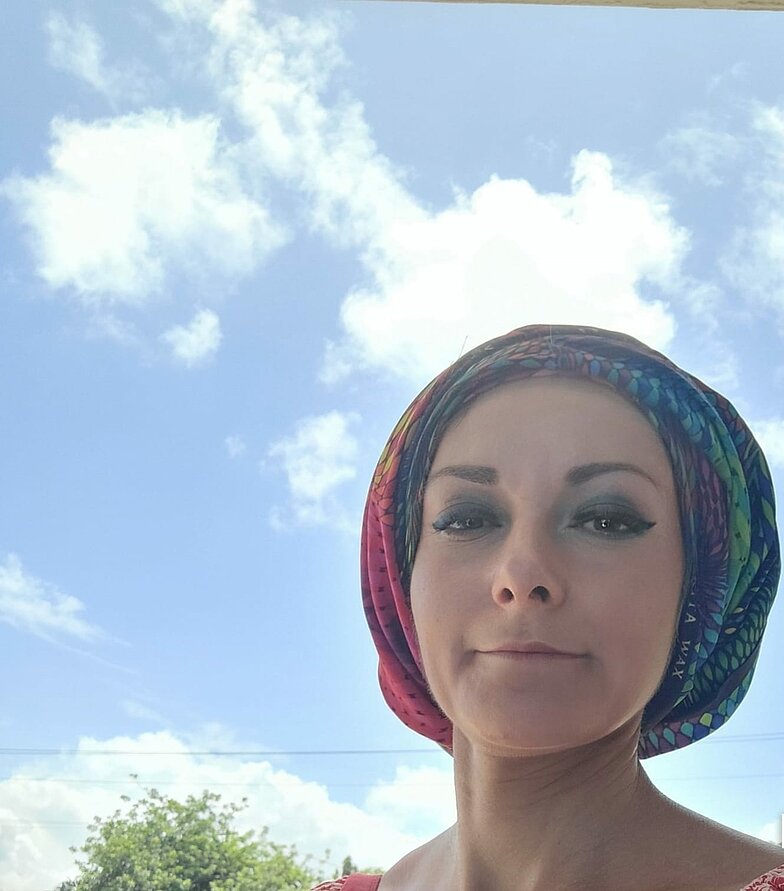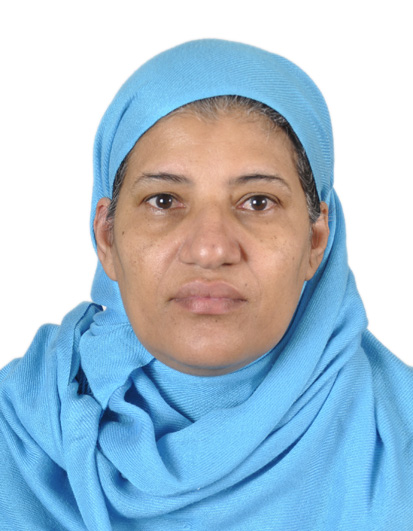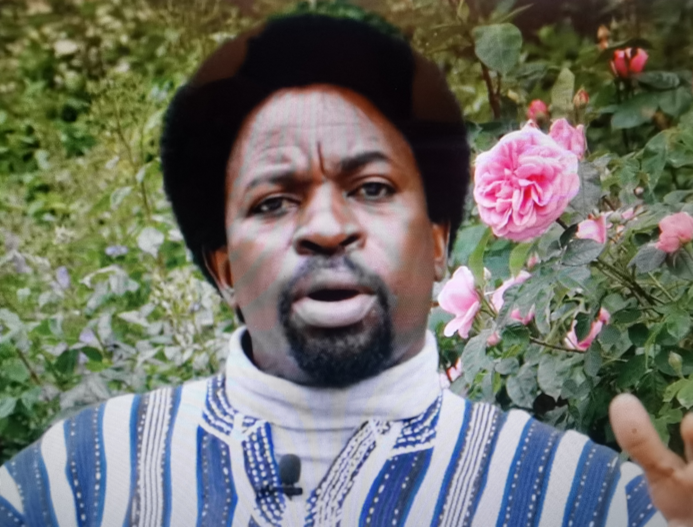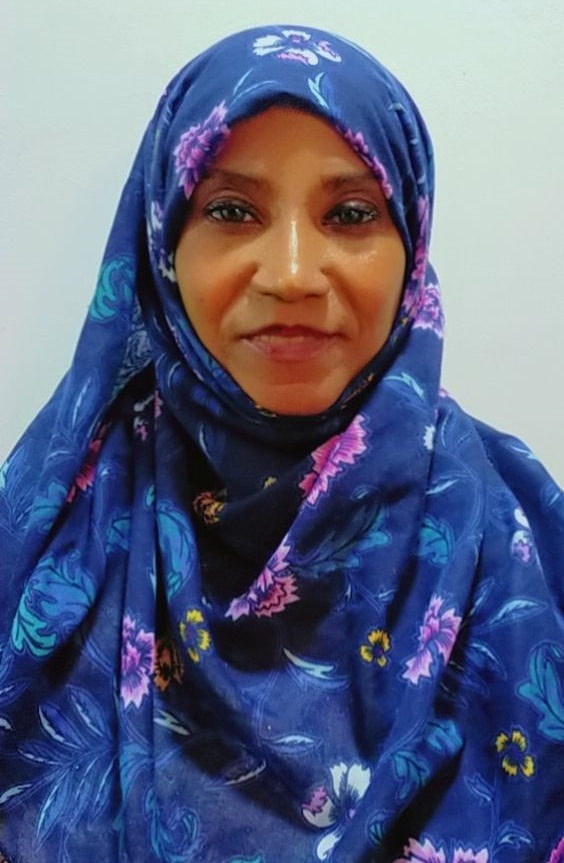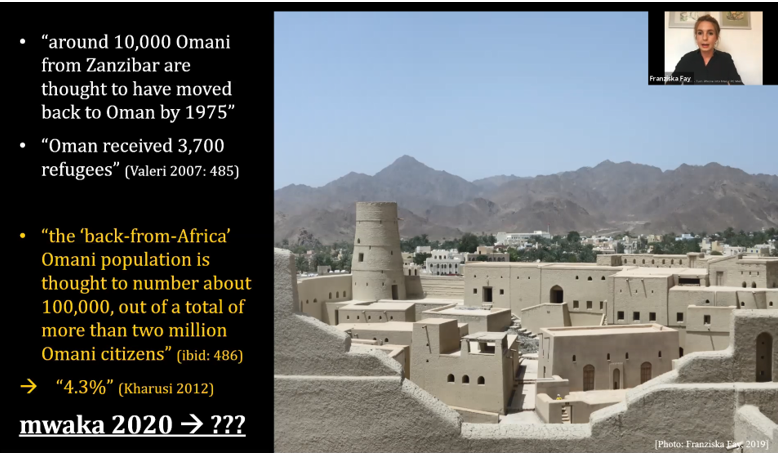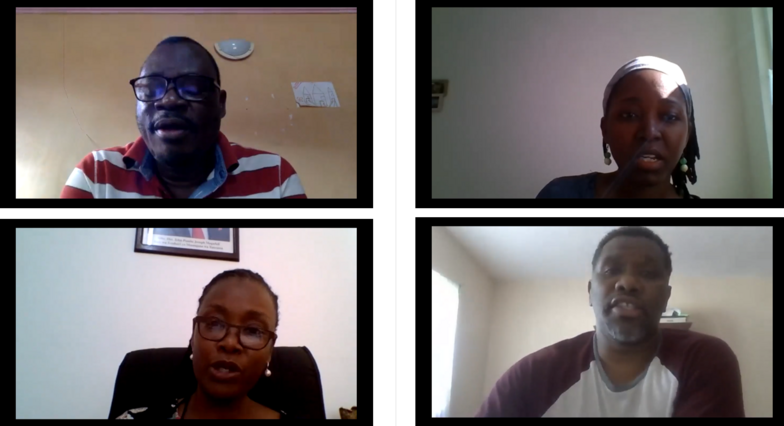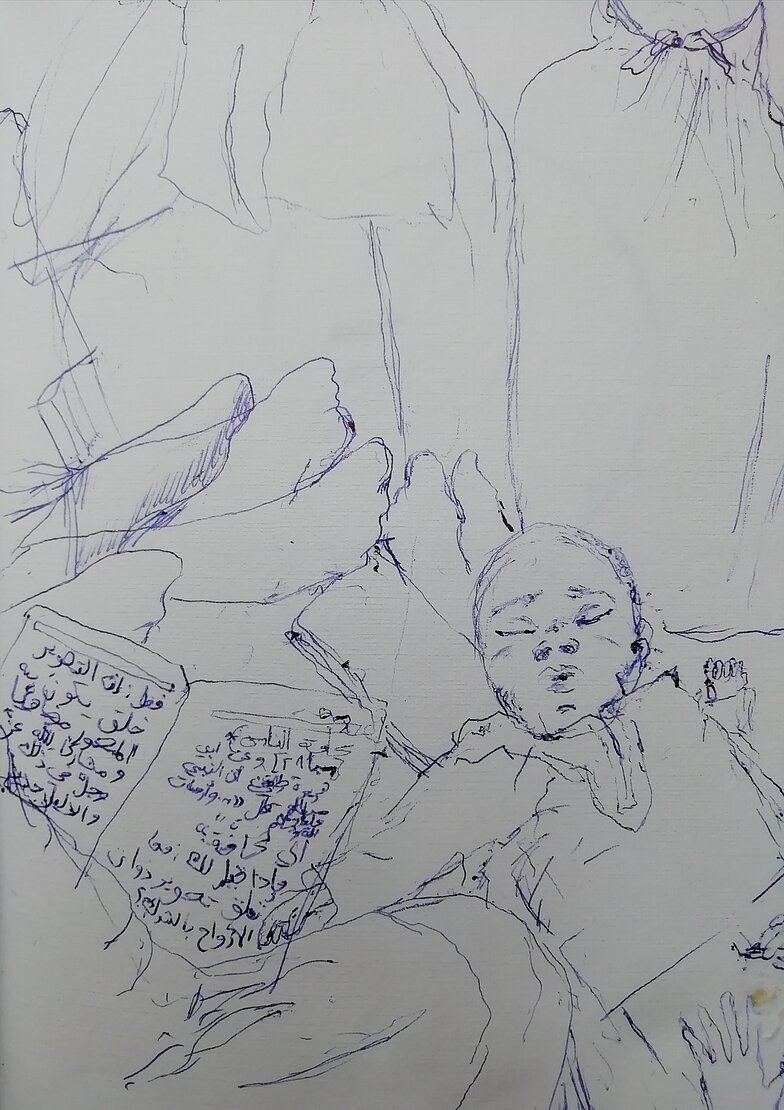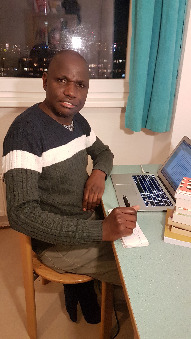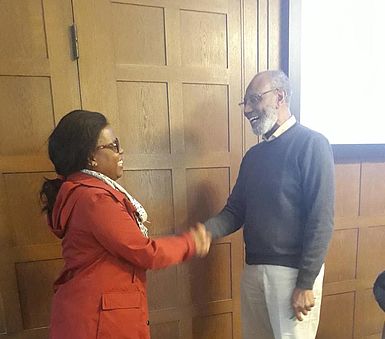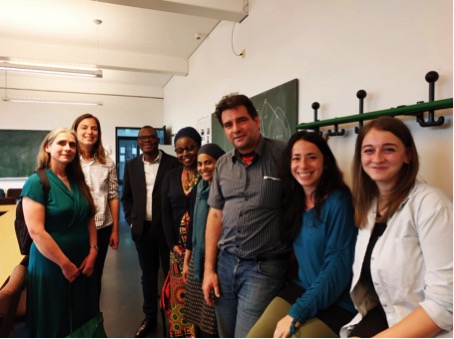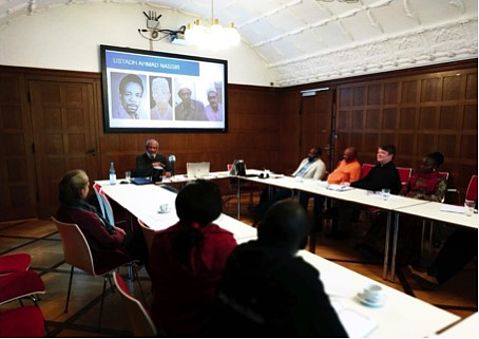6th July 2020
Hassan Mwakimako (Profesa wa Masomo ya Dini, Chuo Kikuu cha Pwani, Kilifi, Kenya)
Nandera Mhando (Mkuu wa Idara, Falsafa na Masomo ya Dini, Chuo Kikuu cha Dar es Salaam)
Nicholas Githuku (Profesa Msaidizi, Historia, Falsafa na Anthropolojia, Chuo Kikuu cha York, CUNY, New York)
Neema Kasabo (Mhadhiri wa Kiswahili, Chuo Kikuu Huru, Berlin).
Baraza liliandaliwa na kutambulishwa na Kai Kresse (Mkurugenzi Msaidizi ZMO na Profesa wa Anthropolojia ya Jamii na Utamaduni, Chuo Kikuu cha Freie Berlin) na Lutz Diegner (Mhadhiri wa Kiswahili, Chuo Kikuu cha Humboldt Berlin)
Katika Baraza letu la kwanza kupitia mtandao wa Zoom, wazungumzaji wanne kati ya watano walioalikwa watokao katika miji mikubwa minne walijadili maono yao juu ya tauni ya Korona na mabadiliko walioyaona katika jamii zao na maisha yao binafsi. Kwa sababu isiyoweza kuzilika, mzungumzaji wetu mahili Bwana Abdilatif Abdalla (Mwandishi wa “Sauti ya Dhiki”, Oxford University Press 1973) hakuweza kuhudhuria.
Akiongea kutoka Mombasa, Hassan Mwakimako alizungumza jinsi usitishwaji wa shughuli ulivyozuia matembezi ya watu katika kaunti za Kilifi, Mombasa na Kwale. Hii imepelekea kushindikana kwa kusafiri kwenda kazini kwa watumishi wanaoishi kwenye miji tofauti na wanayofanyia kazi. Mwanzoni, watu wengi walidhani kwamba ugonjwa huu ni wa ulaya tu. Hali ambayo imepelekea mgawanyiko kati ya wengi ambao waliudharau ugonjwa na wachache ambao waliamini ungonjwa huu upo. Hivyo baadhi ya watu hawakufuata sheria za kiafya dhidi ya ugonjwa huu kwa mgano kutokuvaa barakoa mpaka waone polisi. Toka hapo, mitaa ilipakwa rangi za ishara kuanzia zinazozuia mikusanyiko ya watu hadi kufungwa kwa misikiti. Hii imepelekea upunguaji wa shughuli za kichumi, upatikanaji wa mahitaji ya nyumbani kama samaki wa bahari, uhudhuriaji wa misiba (ukizingatia kizingiti cha watu 15) na kutembelea ndugu, jamaa na marafiki. Katika harakati za kutimiza hatua za kijikinga, neno la Kiswahili “barakoa” limefufuliwa na linatumika mara kwa mara. Katika nyanja za siasa, baadhi ya wanasiasa wameutumia ugonjwa kujijengea umaarufu kabla ya uchaguzi. Hii imekua kupitia jitihada zao kuwahamasisha watu kufuata kanuni zote za kiafya dhidi ya ugonjwa huu.
Kulingana na Nandera Mhando, Tanzania imedhibiti Korona tofauti. Kukiwa na maambukizi 480, waliopona 167 na vifo 16, serikali ya Tanzania iliamua kutangaza watu wanaopona na wale walioko mahospitalini. Pamoja na kuushauri umma kufuta kanuni za usafi dhidi ya Korona, serikali ya Tanzania haikuzuia watu kutoka nje. Wakuu wa serikali ambao ni rais, waziri mkuu na waziri wa afya walikazania hatua za kiafya. Rais na waziri mkuu walitilia mkazo kusali na kujifukiza kama njia kuu za kuepuka ugonjwa ambayo ilipokelewa na watu wengi nchi nzima. Hii iliamsha vipingamizi kutoka kwa wasomi ambao walidhani kuzuia watu kutoka nje kulikua sahihi. Kufikia tarehe 29 Aprili miji mikubwa ilijaa hofu za juu ya kuambukizwa ugonjwa huu. Kwa upande mwingine, vijiji na miji midogo haikuhofu kwa sababu shghuli zao za kila siku haziwaleti kwenye misongamano ya watu wengi. Hali iliyo pelekea kuaminika kwamba ugonjwa huu ni wa miji mikubwa tu.
Uwezo pungufu wa kupima na uhaba wa vifaa vya kujikinga, ulichangia uzinduzi kati ya wasomi na wajasiriamali. Chuo kikuu cha Dar es Salaam kilifanya utafiti uliopelekea kutengeneza barakoa na sanitaiza stahiki. Hii imechagiza utafiti juu ya uwezekano wa dawa za kienyeji zinazotibu Korona ndani ya chuo kikuu, Taasisi ya Utafiti wa Dawa na Taasisi ya Viwanda Vidogo Vidogo. Vilevile, imechangia utafiti juu ya tabia za watu katika kufuata sheria za kiafya dhidi ya ugonjwa wa Korona.
Kwa sababu ya uwezo pungufu wa kupima, watu katika miji mikubwa imewabidi waishi kwa uvumi mwingi kwa sababu hakuna takwimu sahihi juu ya maambukizi – na wamejifunza kuishi na ugonjwa. Kumwekua pia na kikomo cha wahudhuriaji kumi katika mazishi, ambayo imeathiri tamaduni ya ndugu kukutana pamoja na kuzungumza mambo ya kifamilia misibani. Hali ambayo imepelekea usambaaji wa picha za WhatsApp juu ya mazishi ya usiku wa manane na kuongezeka kwa makaburi katika miji mikubwa. Hofu iliongezeka. Baada ya serikali kuruhusu safari za misiba nje ya miji mikubwa, usambaaji wa picha hizi ulianza kupungua. Katika mwezi wa sita, utalii, mahoteli na shule zilifunguliwa – na wakati huo huo maandalizi ya uchaguzi yalianza. Yote kwa yote uvumi unaendela kusambaa na kufanya maisha yawe ya wasi wasi.
Akiongea kutoka New York, Nocholas Githuku alieleza kwamba mafunzo yamekua ya mtandaoni toka watu walipozuiwa kutoka nje – ambayo imewasumbua watu wazima maana hawajui kutumia teknolojia hii sana. Kama ilivyo Tanzania, kumekua na hofu sana za kuambukizwa pale watu wakitoka nje kufanya manunuzi ya muhimu. Kizuizi cha kutoka nje chini ya uongozi wa gavan Cuomo kumepelekea watu kukosa mazoezi. Hali iliyopelekea wao kufanya maamuzi binafsi. Kwa mfano, Nicholas Githuku alikimbia maili 80 katika mwezi wa Juni. Changamoto mbili za muhimu alizotaja ni kwamba imekua ngumu kutambua watu wa karibu kwa sababu ya barakoa. Alieleza wasiwasi kwamba kuweka umbali kunaweza kutumiwa kama kisingizio na watu ambao ni wabaguzi wa kitamaduni kwa ajili ya kubagua watu dhidi ya rangi ya ngozi. Hii inafuatia baada ya unyama wa askari wa Marekani ulipeleka mauaji ya George Floyd.
Neema Kasabo, mkazi wa Berlin kutoka Tanzania, alielezea kwamba kumekua na uhaba wa chakula katika masoko makubwa, matamasha na mikusanyiko ya waimba kwaya ilisitishwa na shule zilifungwa. Kwa kipindi fulani wazee hawakuweza kuwaona wajukuu zao ana kwa ana. Baadhi ya hoteli zilifunguliwa kwa ajili ya kuwajali watu wasio na makazi na baadhi ya watu waliwapatia chakula.
Kufuatia wazungumzaji, wahudhuriaji walichangia kwa uhai katika mazungumzo wakiuliza maswali na kuchangia katika mada. Maswali yalihusu changamoto za usawia wa kazi, kusimamia watoto kujifunzia kutoka nyumbani, kuzoea masomo ya mtandaoni na kufanya biashara. Mada mashuhuri ilichangiwa na mwanafunzi wa kike kutoka Cape Town ambapo mpaka baraza, ilikua ni siku ya 100 ya kutokutoka nje. Alieleza kua imepelekea changamoto za kiakili kwa mabinti ambao wamekua wakinyanyaswa kijinsia na vijana wa kiume wenye malengo mabaya ambao kwa sasa wapo nao mabwenini ukilinganisha na muda mchache kipindi walipokua wakienda shule.
Unaweza kupata habari zifananazo katika ukurasa wetu wa Korona. Mfano hali ya Maisha Mji wa kale, Mombasa, safari ya Abdilatif Abdallah Afrika Mashariki na mapokeo ya Uganda.
English
Baraza with Hassan Mwakimako (Associate Professor of Religious Studies, Pwani University Kilifi, Kenya), Nandera Mhando (Head of Department, Philosophy and Religious Studies, University of Dar es Salaam), Nicholas Githuku (Assistant Professor of History, Philosophy and Anthropology, York College, CUNY, New York), and Neema Kasabo (Lecturer for Swahili Language, Freie Universitait, Berlin).
Hosted and introduced by Kai Kresse (Vice-Director ZMO & Professor of Social and Cultural Anthropology, Freie Universität Berlin) and Lutz Diegner (Lecturer of Swahili, Humboldt Universität Berlin).
In our first virtual Baraza event and during a digital discussion over Zoom, four of the five invited speakers located in four different countries spanning three continents discussed their experiences regarding the Coronavirus pandemic, with a view to the changes they have observed both in public and in their private lives. Unfortunately, our announced decorated speaker Abdilatif Abdalla (writer of “Sauti ya Dhiki”, Oxford University Press 1973) was not able to participate, for reasons out of his control.
Speaking from Mombasa, Hassan Mwakimako illuminated on Kenya’s lockdown context that restricted movement of people for Kilifi, Mombasa, and Kwale counties. This has made commuting to work impossible for workers living in a separate town from where they work. Initially, most people thought that this disease was only affecting Western countries. This led to a divide between the many who took it for granted and the few that took it seriously. As a result, some people were not following the sanitary rules against the virus by for example not wearing masks until they see police. Streets have since been colored with signposts from prohibiting groups to assemble to the closure of mosques. As a result, the town has had limited economic activity and access to household items, such as Mombasa’s sea food. Also, the fulfillment of social responsibilities like attending burial ceremonies (considering a 15 people quota) and visiting family and friends have been strongly constrained. Within the processes of implementing prevention measures, the Swahili word “barakoa” (meaning a mask) has been coined and is in frequent usage. On the political scene, some politicians have used the disease as an opportunity to seek more popularity, through their efforts to spread the message for the need to follow sanitary rules.
Per Nandera Mhando, Tanzania dealt with Corona differently. Standing with 480 infections, 167 recoveries and 16 deaths, Tanzanian government decided to only announce recovery and hospitalized numbers. Alongside advising the public to follow sanitary rules against COVID-19, the Tanzanian government did not implement a lockdown. Government icons, namely the president, prime minister, and minister for health, were exemplars on hygienic rules of washing hands, wearing masks and using sanitizers. While the minister for health emphasized sanitary rules, the president and prime minister emphasized on the need to pray to God as the main approach to shy away the virus that set a tone throughout the country. This aroused criticism from the elite who saw need for a lockdown. By the 29th of April, cities were clouded by worries to contain the virus. On the other hand, villages and small towns were not, since their daily activities exposed them to relatively less congestion compared to big cities. This invoked an idea that the disease is for cities.
Low testing capacity and scarcity of protective equipment stimulated innovation among intellectuals and entrepreneurs. The University of Dar es Salaam conducted research that led to the production of suitable masks and sanitizers. As a ripple effect, it has encouraged research on the potentials of traditional medication against the virus within the university, at the National Institute for Medical Research and Small Industries Development Organization. Corollary, it encouraged behavioral research on how people cope with sanitary rules against the virus.
On the other hand, due to limited testing capacity, people in cities have to live with many rumors, since there is no exact data on the spread – and they have adjusted to live with the disease. There has also been a restricted quota of only ten attendees in burial ceremonies, which severely limited established cultural patterns for relatives to get together and talk about family matters. This led to the circulation of WhatsApp pictures for late night burial ceremonies and the expansion of graveyards in big cities, which in turn ignited worries. After the government allowed travel for burial in hometowns, the spread of these pictures began to wane. In the month of June, tourism, hotels and schools were open – and at the same time, election preparations began. In sum, rumors continue to spread, making life worrisome.
Speaking for New York City, Nicholas Githuku pointed out that teaching and learning in higher education has been online since lockdown – which challenged the older generation that is less IT-savvy. Like in Tanzania, there has been a cloud of worries of containing the virus amongst New York residents, who at times needed to go out running important errands. A strict lockdown under governor Cuomo has led to people lacking their regular exercises. In this regard, they took individual initiatives to exercise. For example, Nicholas Githuku speed-walked 80 miles in the month of June. Along different lines, two important challenges he mentioned were, that it has been hard for people to identify familiar faces due to the imposition to wear masks, and he also expressed concern that social distancing laws could be used as an excuse for racial discrimination, in the context of ongoing protests against American police brutality that had led to the murder of George Floyd.
Neema Kasabo, a Berlin resident, explained that there has been scarcity of food items in the local super markets, and concerts and choir gatherings were cancelled and schools were closed. For some time, grandparents were not able to see their grandchildren in person. In order to take care of the homeless, some hotels were open to accommodate them and some people supplied food to them in the streets.
Following the four speakers, members of the audience contributed to the discussion in a lively manner, asking follow-up questions and contributing further accounts of their own experiences, also in other countries, like Ethiopia and South Africa. Questions included challenges of balancing work, supervising children’s home-schooling, adopting online learning pedagogy and doing business. A notable contribution from a female student in Cape Town was that given a 100 day strict lockdown, female students have been experiencing mental health issues as a result of abusive male students they spend all day with in dormitories as opposed to a few episodes of a day when they were able to go to school.
You can find related updates on our Corona webpage. Examples include lived experiences in Old Town, Mombasa, Abdilatif Abdallah's travel across East Africa and Uganda's response to the pandemic.

